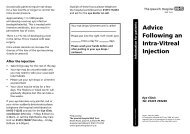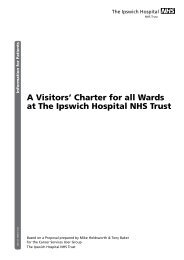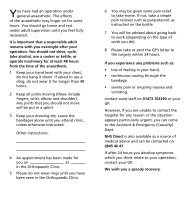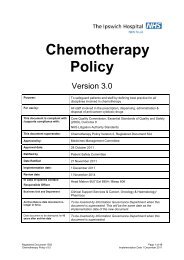Amputation: Advice Guide - Ipswich Hospital
Amputation: Advice Guide - Ipswich Hospital
Amputation: Advice Guide - Ipswich Hospital
You also want an ePaper? Increase the reach of your titles
YUMPU automatically turns print PDFs into web optimized ePapers that Google loves.
Information for Patients<strong>Amputation</strong>:<strong>Advice</strong> <strong>Guide</strong>General SurgeryTel: 01473 702700DMI ref: 2546-07.indd(RP)Issue 4: July 2007© The <strong>Ipswich</strong> <strong>Hospital</strong> NHS Trust, 2001-2007. All rights reserved. Not to bereproduced in whole, or in part, without the permission of the copyright owner.
Information Following a Leg <strong>Amputation</strong><strong>Amputation</strong> of a limb, although initially daunting should be viewed asa positive way of ensuring that your future quality of life is enhanced,rather than accepting the continuous pain, discomfort and poormobility you may be currently experiencing.Why is a Leg <strong>Amputation</strong> Performed?An amputation is usually performed because the blood vessels(arteries) in your legs have become blocked or from trauma or injury.<strong>Amputation</strong> will only be performed when the blood supply to theaffected limb(s) cannot be improved. If surgery is not performed, thelimb will probably develop gangrene and you will become unwell. Theconsultant will decide which is the most appropriate operation foryour condition and this will be discussed with you.The decision to amputate will only be taken when there are noalternative options and you will be fully involved in making thedecision.Page 1
General <strong>Advice</strong> for Those Who Require an<strong>Amputation</strong>SmokingIf you smoke, try to stop, as it is a contributory factor of yourcondition. The arteries and lungs will benefit and you will feelhealthier.DietTry to follow a healthy diet. Keep your weight within normal limits,as this will enhance your mobility. If you require help to lose weight,or you feel that you are underweight, the nursing staff will contact adietitian and request a visit to discuss your nutritional requirements.AlcoholThe weekly recommended safe limit for men is 21 units, and 14 unitsfor women evenly spread throughout the week. Do speak to thenursing staff if you require support in reducing your alcohol intake.Preparing for a Leg <strong>Amputation</strong>PhysiotherapyIf possible a physiotherapist will come and see you prior to a routineoperation to discuss their role in your rehabilitation. After theoperation you will require a wheelchair, which the physiotherapist willsupply for the short term. You will be taught how to use a wheelchair;if you are planning to use an artificial limb, you will still need awheelchair temporarily or for long trips. The physiotherapist will giveyou exercises to strengthen the muscles around the stump and showyou how to transfer safely into your wheelchair. The physiotherapistwill give you an advice booklet.Page 2
Occupational TherapyThe overall aim of occupational therapy is to help you maintain yourquality of life. An occupational therapist will help to prepare you tolearn new skills for coping with everyday tasks and offer advice onany beneficial changes to your home. They will assess and provide youwith a long-term wheelchair.Social WorkerThe social worker will be able to advise you on any benefits orhelp that you may require throughout your stay in hospital and ondischarge.DietitianThe dietitian may see you to ensure that you are eating enough of thecorrect foods and will alter your dietary needs. A good well balanceddiet will help your wound heal quickly.NurseThe nurses have a responsibility to look after you throughout yourstay in hospital. They will liaise with the multidisciplinary team (socialworker, physiotherapist and occupational therapist) to ensure thatyour discharge will be safe and satisfactory. Do contact a member ofthe nursing staff if you require any further advice.DoctorsThe consultant visits the ward at least twice a week and will reviewyour wound and your general health. If you or your family have anyquestions please contact the nurse in charge of the ward. If the nurseis unable to answer your questions, they will contact the medicalteam and arrange for one of them to speak to you. Alternatively, youor your family can contact the consultant’s secretary to arrange anappointment.Page 3
The OperationOne of the ward nurses will take you to the operating departmentwhere the theatre nurse and doctors will look after you. You willeither be given a general anaesthetic or you will have a fine tubeinserted into your back (spinal / epidural) through which pain reliefcan be given to numb the lower half of the body. The anaesthetistwill come to see you on the ward about this before you go to theatre.Once you have had the operation you will spend time in the recoveryarea until you are ready to go back to the ward. The ward nurse willcome to collect you, and accompany you back to the ward.After the OperationWhen you wake up you may have an intravenous infusion (drip) inyour arm. This will help keep you hydrated. The intravenous infusionswill be removed when you are drinking and eating well. The nurseswill check your blood pressure, pulse and wound at frequent intervalsto ensure that there are no complications.Sometimes a catheter is inserted into your bladder, which drains yoururine. This is to avoid the need for you to worry about going to thetoilet until you are more mobile. The catheter will be removed whenyou and your doctors feel you are ready.A drainage tube, which goes into a container, may be inserted nearthe wound during the operation. This drains any excess blood or fluidwhich may collect around the operation site. This will be removedwithin two days or when there is little or no drainage.Oxygen may be given after the operation to assist recovery from theanaesthetic.The nursing staff will give you pain relief regularly. Please informthem if your wound is still painful or if you experience any pain.The wound dressing is usually left alone for the first few days.Page 4
After this, it will be dressed on a daily basis until no further dressingsare required. Skin stitches or plasters will be removed approximately14-21 days after your operation.Sometimes, people experience the sensation that the amputated legis still there. This is often referred to as phantom pain. This happensbecause the cut nerves continue to send messages back to the brain.After a few months the brain usually starts to ignore this and thephantom pain lessens. Doctors can also prescribe medication to reducethe sensation of phantom pain. Please inform a member of staff if youdevelop any of the following symptoms: crushing, piercing, twisting,stabbing or burning of the amputated limb.It is not unusual to sense the loss of a limb in the same way as youmight feel following bereavement. It may help that a new positiveexperience will help to heal the loss you have felt. Having the freedomfrom pain can improve your sleep, strength and quality of life. Shareyour feelings with the people looking after you who will support andadvise.Driving may be possible after you have fully recovered froman amputation in either an automatic car or following somemodifications to a manually driven car. You must inform the DVLA andyour insurance company. Sometimes you may need to visit a specialistcentre for advice or a re-test. You can ask the occupational therapistfor more information.You may resume sexual activity when you feel comfortable to do so.Be guided by the professional staff as it may take several months toregain your strength fully and you will need to accommodate to anew life style. Do ask if you require any further information.Page 5
ComplicationsDue to poor blood supply, wound healing can sometimes be slowand very occasionally it is necessary to perform further surgery to theamputation site if your wound does not heal. The wound may becomeinfected and may require treatment with antibiotics.Chest infections can occur following amputation, particularly inpeople who smoke and may require some antibiotic therapy.Rehabilitation After Your OperationPreparing for Discharge from <strong>Hospital</strong>The team is aware that this can be a traumatic time for you andyour family. Therefore, we plan to work with you and your family toensure a safe discharge. You may be transferred to another ward or toanother hospital for further rehabilitation prior to discharge.You will be discharged when you are able to manage in thecommunity. Arrangements will be made by the occupational therapistto take you on a home visit before discharge in order to identify anyproblems you may encounter at home and to identify solutions tothese problems.They will also perform other assessments:• To ensure that you have necessary skills and support to manage athome.• Provide equipment to enable maximum independence.The occupational therapist and physiotherapist will supply awheelchair and you will be required to continue your exercises thathave been suggested.Page 6
Discharge From <strong>Hospital</strong>The hospital will give you 28 days’ supply of medication.A letter will be given to you or your carers to take to your GP.This letter will inform your GP about your treatment and any newmedication you are taking.A community nurse will visit you at home to check the wound, ifnecessary and to ensure that you are coping at home.An outpatients appointment will be made for you to see yourconsultant surgeon following discharge from hospital. This will beposted to you. The appointment is usually for 4-6 weeks followingdischarge.The physiotherapist may send you an appointment to attend thephysiotherapy outpatient department. You may also be sent anoutpatient appointment for the limb fitting clinic. This is usually heldon Friday mornings.The occupational therapists hold group meetings to provideinformation and to help you and your carers. These are heldwhen there are enough people interested. If you would like moreinformation and to get involved with this group, please mention it toyour occupational therapist.The social worker will put in place carers, if required, as well ashelping you obtain benefits. The disablement services centre visits The<strong>Ipswich</strong> <strong>Hospital</strong> NHS Trust on a Friday morning at limb fitting clinicand they will advise you regarding benefits and driving or additionalinformation, which you may require.If you have further queries please contact a member of staff who willadvise.Contact telephone number:Page 7
You may have some questions you would like to askthe staff looking after you. You can use this space tomake a note of them.Page 8
Produced by:The <strong>Ipswich</strong> <strong>Hospital</strong> NHS TrustHeath Road, <strong>Ipswich</strong>, Suffolk IP4 5PD<strong>Hospital</strong> switchboard: 01473 712233www.ipswichhospital.nhs.uk
















